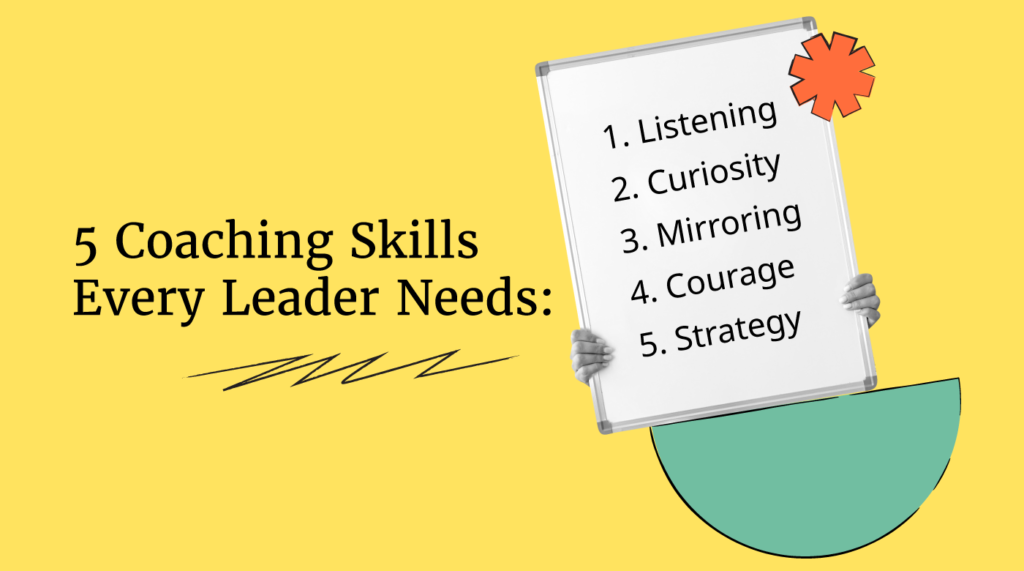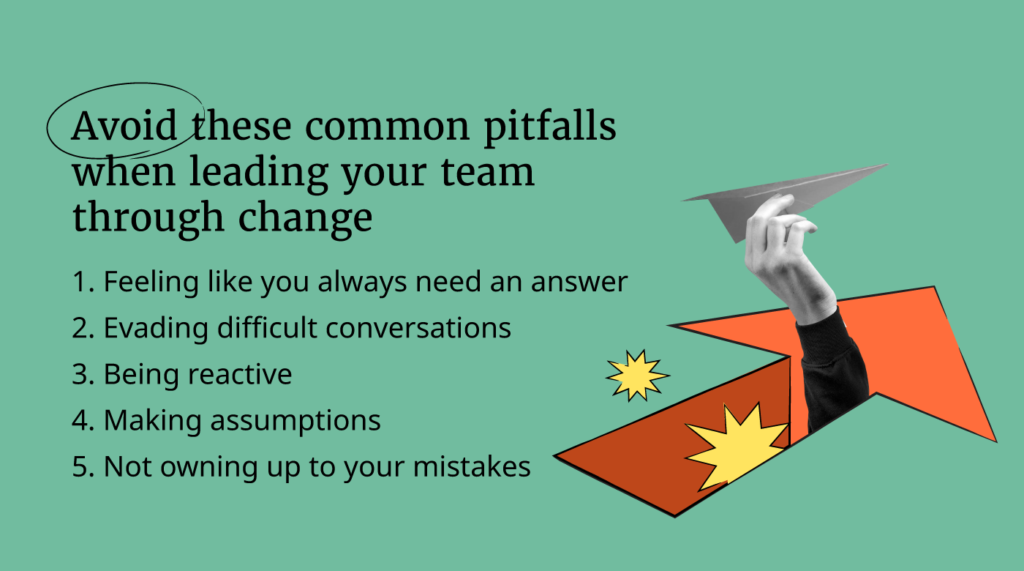Leaders are struggling to guide their teams effectively as they navigate the COVID-19 global pandemic, the ‘Great Resignation,’ and an unstable economy.
Recent research by BetterUp shows that one-on-one coaching helps employees navigate change by building the resilience, authenticity, and overall well-being to thrive against uncertainty.
As an executive coach who partners with senior managers and executives as they navigate complex change, I can attest that coaching is a powerful tool to help tackle ambiguity and uncharted territory with self-assurance.
In this article I'll:
- Break down the importance of coaching your team during times of change
- Share five coaching skills every leader needs to be successful right now
- Share mistakes to avoid when attempting to coach your team during these challenging times.
Sprinkled in are insights from several people managers and global experts in coaching. So let’s get to it!
Why coaching is a crucial people manager skill?
So, why do people managers also need to learn how to coach? To begin, coaching is the process of empowering your employees to discover answers to their problems through asking powerful questions and helping them to self-discover. Learning how to coach will enable you to guide your team to become more self-sufficient and productive.
But these aren’t the only advantages of learning how to coach your team well. Additional benefits to employees include:
- Gaining a clearer understanding of your employees’ strengths and areas of opportunity
- Creating a space for teams to experiment, make mistakes, learn, and grow
- Increasing employees’ communication skills, self-awareness, and emotional intelligence.
But coaching doesn’t just benefit your employees. Vanessa Shaw, the founder of momentous.work, explains that “creating a coaching culture in your team not only supports the team but also you as a leader.”
During times of change, such as the global COVID-19 pandemic, the looming recession, and the current political climate, coaching is a particularly helpful change management tool.
As Tracy Avin, founder of TroopHR, explains, “leaders who effectively coach their teams through change will help them realize the learning moments, adapt more efficiently, and advance their capabilities from the experience.”
Lastly, coaching is an opportunity to retain team morale, which can quickly become depleted during challenging times. Jami Delaney, chief care officer and head of people strategy and customer experience at Assemble, says that “coaching helps reinforce the existing trust and confidence of the team that can be an unintended casualty during times of change.”
What coaching skills do managers need to thrive through change?
Coaching requires a blend of skills. What are the most essential coaching skills a modern manager needs to succeed in today’s fast-moving world? According to the experts I spoke with, here are the top five:

Coaching skill 1: Listening
To begin, listening is the number-one skill needed to be a successful and effective coach. While this may sound simple, de la Poer explains that competencies such as “positive regard, not interrupting, stillness, being present, listening beyond the words, noticing body language, [and] what someone is not saying” can be difficult to truly master.
With everything going on in our current world, mastering the art of listening is more important than ever before. However, not all listening is created equal. Begonia explains that “most people listen to respond and are often thinking of the thing they want to say next instead of actually paying attention and deeply listening to what the other person is saying.”
If you want to develop your listening skills, try giving the OARS technique a try:
- Open-ended questions: Ask open-ended questions.
- Affirming: Affirm the speaker’s thoughts and feelings.
- Reflection: Reflect what you heard.
- Summary: Summarize the conversation.
Coaching skill 2: Curiosity
Building upon listening skills, Delaney recommends people managers learn how to get curious when they’re listening. She explains that “when teams feel vulnerable or uncertain, they’re looking to their leader to set the stage for how things will unfold… Teams want their leaders to be clear communicators, compassionate, and confident while leaders have the unique and undoubtedly difficult job of leading while experiencing their own portfolio of emotions.”
Consequently, Delaney advises you to “explore, observe behavior, and consider the idea that each member of your team experiences and processes challenges and change differently.” Doing this “will better prepare you to tap into what the team needs on an individual level and help them maximize their performance when you need them most.”
Learn how to ask powerful coaching questions that provide the coachee an opportunity to explore their options. You can give a few of my favorite coaching questions a try:
- What did you like about that? What didn’t you like?
- What do you think went well? What didn’t?
- Are there any other options available to you?
- Who can help you with that?
- What else?
- What’s the best-case scenario?
- What’s the worst-case scenario?
- Can you tell me more?
I also like to hand over the reigns to the client and ask, “What question do you want me to ask you right now?” or “What question do you not want me to ask you right now?” Both of these questions spark curiosity and get clients to think in new ways.
Coaching skill 3: Mirroring
While listening and curiosity will ensure your team is supported and empowered, mirroring is equally important during turbulent times.
Simply put, “mirroring is empathy in action – it is when you reflect back what your team is feeling so they feel heard, understood, and grounded,” explains Amy Varga, president of The Varga Group. Mirroring is not about trying to fix the present situation. Instead, “it's about your team feeling heard and understood,” even when “you might not be able to tell your team what exactly lies up ahead.”
Varga explains that mirroring is an important coaching skill because you want your team to know that “their feelings matter and that you understand what they are experiencing.” Additionally, she says “change and uncertainty fuels anxiety, and mirroring is an antidote that allows people to take a deep breath, knowing that even if it's not clear what is up ahead, they are not alone in their experiences.”
As a people manager, you can practice mirroring by reflecting what your employees say back to them, then checking in to ensure you summarized their thoughts and feelings correctly. The OARS technique can come in handy here, too. I encourage my coaching clients to integrate OARS into both staff and one-on-one meetings.
Coaching skill 4: Courage
Change can be scary and anxiety-producing, and coaching your employees to find the courage within themselves to enact change can be difficult to accomplish. However, when done right, the results can be incredibly powerful.
But how exactly do you help an employee to show up more courageously in the workplace? Shaw says you “give up on confidence… You don't actually need it to create significant change and meaningful impact at work.” Instead, she recommends “going after becoming your most courageous self, whatever that looks like for you” and your employees.
Partner with your employees to map out what that vision looks like for them, then develop a strategy to turn that vision into a reality. You can ask your employees coaching questions like:
- What do you hope to achieve in the next 6 months, 1 year, and 5 years?
- How will you measure your success?
- What resources and support do you need from me to turn this vision into a reality?
I regularly assign these types of reflective questions as “homework” between meetings, then explore them deeper with clients during coaching sessions. Your role as a coach is to make space for your coachee to find and practice courage.
Coaching skill 5: Strategy
Lastly, you can take your coaching to the next level by helping your employees turn their ideas and insights into action.
As Avin explains, “leaders who provide strategic support while being empathetic see the greatest results with their coaching efforts.” She says that “rather than just identifying an area of opportunity (growth) for an employee/leader, it is important to also have a plan (strategy) to achieve that growth.”
Partner with your coachee to turn their ideas and insights into action plans. During coaching sessions, I often have clients pull up their calendars and add their action items to their schedules to prevent them from falling to the wayside.
Mistakes To Avoid When Coaching People And Teams
Although coaching can be a powerful tool, you also want to look out for these common missteps when leading your team through change:

Mistake 1: Feeling like you always need an answer
You do not need to have all the answers to your coachee’s problems, in fact that’s not the point.
Catherine de la Poer, founder of Halcyon and an adjunct professor at Hult International Business School, urges leaders to avoid the common feeling that they need to fix every problem presented to them.
“The person (the coachee) has the answer to the problem.” Your role as the coach is to simply be present with your coachee and create a space for thinking to take place.
Carissa Begonia, a business and leadership coach and the founder of CONSCIOUSXCHANGE, clarifies that “leaders sometimes don't always have all the information or knowhow to coach through certain situations, and that’s OK.” She says this can become sticky as leaders will sometimes pretend to know the answer, say something just to appease the coachee, or make promises they cannot keep.
The solution? Practice honest, open communication with your staff, even if that is simply notifying them you have nothing new to share.
Mistake 2: Evading difficult conversations
Being able to lead difficult conversations is necessary when you are a people manager, yet many leaders are reluctant to have them.
This is a big mistake. Varga says “people know when you're guessing about the future or putting a rosy spin on an uncertain future. When you act like you know the future when you don't, you lose your credibility. Your team trusts you less, and trust is the most important currency for leaders to have when leading.”
Delaney explains that this is because “leaders often believe their role is to protect their teams during challenging times, and they make the mistake of not being candid.” However, “this action of ‘care’ can backfire and make it more shocking and harder to digest when the team faces a significant change or challenge.” Instead, she recommends that you “bring your teams along on the change journey.”
Mistake 3: Being reactive
We’re all emotional beings and get triggered once and a while, but Shaw says that “being reactive is the most overused error leaders make.” She says “reactive behaviors happen at all levels in an organization and keep you in a loop of putting out fires fast enough so you can be ready to put out the next one.”
To combat this, she says it’s important to “slow down, get curious, [and] think long-term.” If you’re not sure where to start, you can ask yourself and your teams, “What will be the decision we make right now that 3 years from now we will be glad we did?”
Mistake 4: Making assumptions
Avoid generalizations and assumptions. Avin urges that “through these difficult times it’s more important than ever that leaders do not make any assumptions while coaching.” For instance, she says “just because your company is not experiencing layoffs doesn't mean that a spouse or partner of an employee is in the same situation, which can also affect your employees.”
Avin reminds us that “each individual has their own unique considerations to be taken into account when coaching them.” The antidote here is empathy. “Empathy is crucial to driving results with coaching, as all people consume information and learn at different levels. Understanding employees' individual needs throughout the coaching process will drive the most success.”
Mistake 5: Not owning up to your mistakes
Lastly, mistakes happen. Your job as a people manager is to own up to them and take restorative action. “We never set out to make mistakes, but they will happen, especially when facing uncertainty and increasing complexity,” explains Shaw.
However, if you say or do something harmful, “turn toward each other” and “invite a conversation.” As a people manager, “your ability to create, repair and maintain relationships is the precise way to face times of change, uncertainty, and complexity—by doing it together and building trusting partnerships amongst colleagues.”
Final Thoughts
Know that becoming an effective coach takes time, and mastering coaching is a lifelong journey. Consider choosing one or two of the skills in this article to focus your attention and energy on in the coming months, then outline your plan of attack in the comments.
Also, if there are additional must-have coaching skills you would add to this list, share them with us below!
Some further reading:
- How to go from manager to coach
- Why Inclusive Meetings Are Better (And How To Lead Them)
- 5 Powerful Performance Review Questions To Tap Your Team’s Potential
- The Secret Code To Exceptional Leadership (with Ian Mills)
- How To Cultivate A Strong Workplace Culture With Coaching (with Lisa Martin)
- Leadership Coaching: Become A More Rounded Leader


